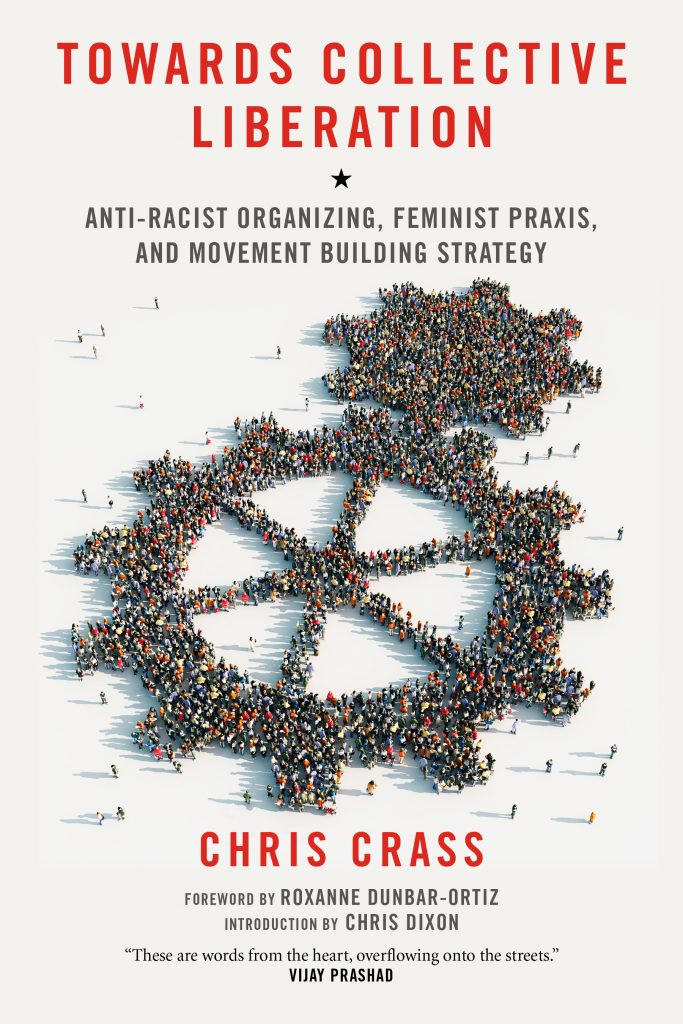
By Dr Zakk Flash
Truthout
January 18th, 2014
More than just an anthology of essays, Chris Crass’s Towards Collective Liberation is a coming-of-age tale for the modern activist. Crass chronicles his growth as an organizer, illustrating how the rewards and challenges of being a college-age activist with Food Not Bombs has shaped his current endeavors in feminist work with men and anti-racist work with majority white groups. In tracing his own evolution as an activist, Crass examines his involvement in half a dozen activist groups, showing how current sociopolitical issues like the Israeli-Palestinian conflict and US wars abroad are linked to struggles at home.
Crass’s book serves two main purposes: as the memoir of an activist fighting racism, sexism, classism and homophobia, and as a self-help book for the beleaguered social justice organizer. Pairing tales of personal development with movement moments, Crass tells the story of his growth in wisdom, and the integration of that wisdom into an intersectional praxis for effective social change. That word, praxis, is one that appears time and time again. Praxis, practice-driven theory, is the engine that drives successful struggle. As Crass tells it, insight isn’t enough; moments of sudden inspiration and new understanding can provide momentum, but sustainable change requires analysis, planning, organization, integration and reflection.
Chris Crass’s life story provides a lens through which to view his take on the birth and death of popular struggle. In organizing against imperialist white supremacist capitalist patriarchy, Crass is organizing against himself. As a white man, raised in capitalist America, the author is granted multiple measures of privilege. In examining the strengths and contradictions inherent in anarchist activism, Crass is dissecting himself, refusing that privilege and questioning its origin. These motivations are what make the book so useful in discussing contemporary activism.
In his long and fairly venerable career as a rabble rouser, Crass has made a lot of friends. He brings them along in Towards Collective Liberation, drawing judiciously from interviews in constructing his narrative. Roxanne Dunbar-Ortiz – historian, writer and professor emerita in Native American studies at California State University – lends academic weight in the foreword; her contribution from a dedicated Marxist revolutionary with extensive radical credentials in feminism and anti-racist work serves to bolster the author’s message. Chris Dixon, fellow at the Institute for Anarchist Studies, brings along his own experiences in the book’s introduction. Well-known in anti-authoritarian and indigenous solidarity organizing circles, Dixon’s recommendation of the book adds to its gravitas.
Emotionally honest, Towards Collective Liberation deals with the stress, disillusionment and everyday difficulties of social change work. The self-replicating social dynamics of hierarchy pop up even in the most dedicated of revolutionary lives; if we’re working for radical political, economic and cultural changes, we must remember that this work is called “struggle.” And while it seems simple, addressing feelings, communication, conflict and resistance in day-to-day interrelations can make a serious difference. Crass’s book illuminates the means by which oppression is reinforced by hierarchies of hegemonic groups. In doing so, he provides opportunities for reflection on how that oppression might be lessened.
Empire is not inevitable. Racism, sexism, nationalism, homophobia are not the natural order of things. In putting this book together, Chris Crass has created a compelling volume with a simple message: Our personal and collective liberation is bound up in the liberation of others.






